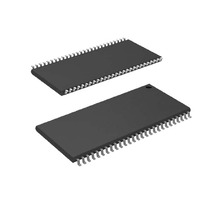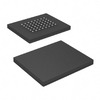Manufacturer Part Number
CY7C1061AV33-10ZXI
Manufacturer
Infineon Technologies
Introduction
This product is a high-speed CMOS Static Random Access Memory (SRAM) designed for applications requiring fast access time and high data reliability.
Product Features and Performance
Volatile memory type
Asynchronous SRAM technology
16Mbit memory size
Organized as 1M x 16
Parallel memory interface
10ns write cycle time and access time
Operating voltage range of 3V to 3.6V
Surface mount, 54-TSOP II package
Supports operating temperatures from -40°C to 85°C
Product Advantages
Fast access time enhances system performance
High data reliability and integrity
Broad operating temperature range suits various environments
Compatible with a wide range of operating voltages
Compact TSOP package for space-limited applications
Key Technical Parameters
Access Time: 10 ns
Memory Size: 16Mbit (1M x 16)
Supply Voltage: 3V ~ 3.6V
Operating Temperature: -40°C ~ 85°C
Write Cycle Time: 10ns
Package: 54-TSOP II
Quality and Safety Features
Fabricated using robust CMOS technology for enhanced reliability
Designed to meet stringent industry safety standards
Compatibility
Compatible with a broad range of microcontrollers and processors requiring fast memory access
Application Areas
Ideal for high-performance computing systems
Suitable for networking and telecommunications equipment
Applicable in automotive and industrial control systems
Product Lifecycle
This product is marked as obsolete, suggesting that it may be nearing the end of its production lifecycle
Replacement or upgrade options may be limited, requiring consultation with the manufacturer
Several Key Reasons to Choose This Product
Exceptional speed with 10ns access and write cycle times significantly boosts system efficiency
Large memory capacity of 16Mbit suitable for complex data storage needs
High reliability and robust operation in a wide range of temperatures and voltages
Obsolescence status necessitates careful planning for long-term projects, highlighting the need for advanced purchases or exploration of next-generation alternatives




 CY7C1061AV33-10BAXIInfineon TechnologiesIC SRAM 16MBIT PARALLEL 60FBGA
CY7C1061AV33-10BAXIInfineon TechnologiesIC SRAM 16MBIT PARALLEL 60FBGA